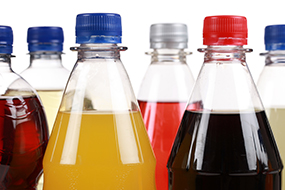- Home
- Editorial
- News
- Practice Guidelines
- Anesthesiology Guidelines
- Cancer Guidelines
- Cardiac Sciences Guidelines
- Critical Care Guidelines
- Dentistry Guidelines
- Dermatology Guidelines
- Diabetes and Endo Guidelines
- Diagnostics Guidelines
- ENT Guidelines
- Featured Practice Guidelines
- Gastroenterology Guidelines
- Geriatrics Guidelines
- Medicine Guidelines
- Nephrology Guidelines
- Neurosciences Guidelines
- Obs and Gynae Guidelines
- Ophthalmology Guidelines
- Orthopaedics Guidelines
- Paediatrics Guidelines
- Psychiatry Guidelines
- Pulmonology Guidelines
- Radiology Guidelines
- Surgery Guidelines
- Urology Guidelines
Consumption of Sugary beverages increase disability in Multiple Sclerosis: Study

MINNEAPOLIS -Consumption of Sugar-sweetened beverages increase disability in Multiple Sclerosis, finds a new Study.
For people with multiple sclerosis (MS), drinking around 290 calories per day of soda or other sugar-sweetened beverages, or the equivalent of about two cans of non-diet soda, may be tied to more severe symptoms and a higher level of disability compared to people with MS who seldom consume sugar-sweetened beverages. The study will be presented at the American Academy of Neurology's 71st Annual Meeting in Philadelphia, May 4 to 10, 2019.
People who seldom drank sugar-sweetened beverages consumed an average of seven calories in sugar-sweetened beverages per day, or the equivalent of one-and-a-half cans of non-diet soda per month. Soda and other sweet beverages were the only type of food that was related to MS symptoms in the study.
"MS patients often want to know how diet and specific foods can affect the progression of their disease," said study author Elisa Meier-Gerdingh, MD, of St. Josef Hospital in Bochum, Germany, and a member of the American Academy of Neurology. "While we did not find a link with overall diet, interestingly, we did find a link with those who drank sodas, flavored juices, and sweetened teas and coffees."
The study involved 135 people with MS. Participants completed a questionnaire about their diet. Researchers then looked at how close each participants' diet was to the Dietary Approaches to Stop Hypertension (DASH) diet. The DASH diet recommends whole grains, fruits and vegetables, low-fat dairy products, lean meats, poultry and fish, and nuts and legumes and limits foods that are high in saturated fat and sugar.
"We chose to study the DASH diet because adherence to the DASH diet is associated with lower risk of other chronic diseases like high blood pressure, diabetes and cardiovascular diseases," said Meier-Gerdingh.
Researchers also measured the participants' level of disability using the Expanded Disability Status Scale, a common method to quantify disability ranging from 0, no symptoms, to 10 points, death due to MS. A total of 30 participants had severe disability.
Overall, researchers did not find a link between what participants ate and their level of disability.
For soda and sugar-sweetened beverages, the participants were divided into five groups based on how much they drank. The people in the top group drank an average of 290 calories of sugar-sweetened beverages per day, while the lowest group seldom drank sugar-sweetened beverages.
The study found that participants who consumed the largest amounts of sugar-sweetened beverages were five times more likely to have severe disability than people who seldom drank sugar-sweetened beverages. Of the 34 people in the top group, 12 had severe disability, compared to 4 of the 34 people in the bottom group. The top group had on average a disability score of 4.1 points, while the bottom group had an average of 3.4 points.
"While these results need to be confirmed by larger studies that follow people over a long period of time, and the results do not show that soda and sugar-sweetened beverages cause more severe disability, we do know that sodas have no nutritional value and people with MS may want to consider reducing or eliminating them from their diet," Meier-Gerdingh said.
Limitations of the study include the relatively small number of participants. The study also assessed participants' diets and sugar-sweetened beverages at the same time as disability, so it is not possible to distinguish whether it is actually an aspect of diet, like sugar-sweetened beverages, that contributes to higher disability or whether more severe disease impacts a person's ability to have a healthy diet.
Additional studies are needed to evaluate whether sugar-sweetened beverages affect the course of the disease.

Disclaimer: This site is primarily intended for healthcare professionals. Any content/information on this website does not replace the advice of medical and/or health professionals and should not be construed as medical/diagnostic advice/endorsement or prescription. Use of this site is subject to our terms of use, privacy policy, advertisement policy. © 2020 Minerva Medical Treatment Pvt Ltd